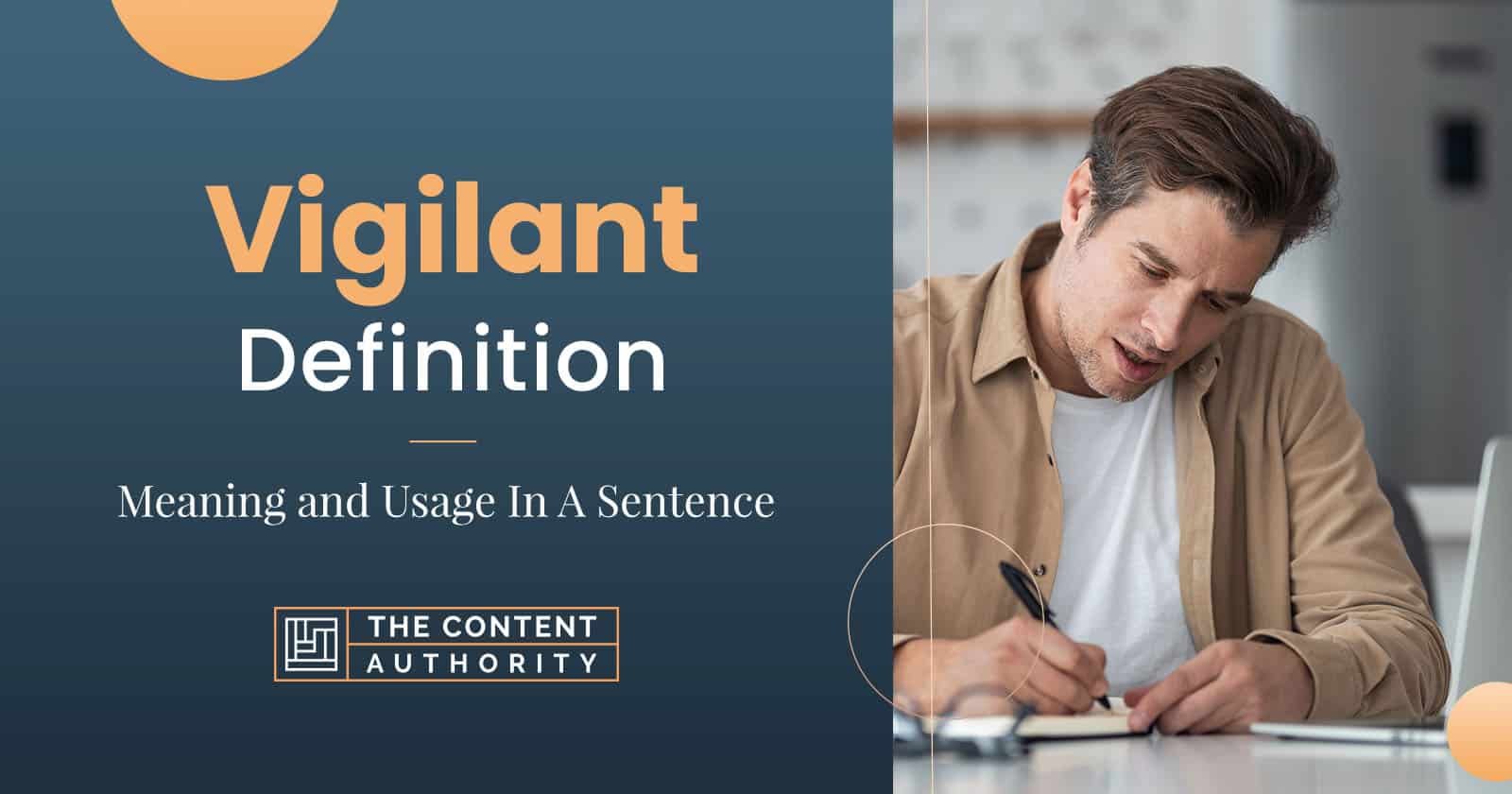Are you that person who’s more into writing and reading books and articles but rarely talks with people? Such behavior is quite common, and you might find yourself in a position where you can’t eloquently pronounce some words because you don’t practice them in speech. When it comes to the word vigilant, you need to know the vigilant definition, meaning, and usage for a comprehensive understanding.
The definition of vigilant is “being attentive, careful, or on the lookout for any possible danger.” The word comes from the term vigil, which means staying awake to watch for potential risks. The term vigilant can also refer to being engaged in keen observation of someone or something.
Whether you knew what vigilant means or had no idea, this article will help you learn all you need to know about this word. We will also discuss other words derived from “vigilant” and some practice sentences to help you learn more. Before we look at the practice sentences, let’s begin with the vigilant definition and meaning.

What Is the Definition of Vigilant?
Vigilant, by definition, is continually being cautious of possible danger. When someone is cautious of something, the body and mind are on high alert in anticipation of a possible occurrence.
More so, when someone is described as a vigilant person, they are very careful to notice anything out of place or amiss. Such a person will not do things randomly. Instead, they opt to take calculated steps and be keen on noticing any trouble. If you’ve come across such a person, you’ll quickly refer to them as paranoid due to their constant alertness.
Here are some examples in sentences:
- When in the bar alone, you must be vigilant of people who spike other people’s drinks.
- The dark web is not your ordinary internet experience. You should always be vigilant of hackers that steal your identity or information and sell it.
What Is the Meaning of Vigilant?
The word vigilant can also be applied in wildlife to mean an animal constantly on the lookout. Such animals are always watchful and exercise caution all the time.
In the animal kingdom, an animal that is always watching for any possible danger or trouble can be described as a vigilant animal. Such animals usually scan their surroundings for any possible dangers, while others go to the extent of staying awake to keep themselves safe. It’s because of fear of their predators or deciding to take care of their young ones.
Read these example sentences:
- A vigilant rabbit will have their body in a tense position and its ears upright, facing forward.
- The leopard vigilantly watches its location as it feeds on its prey.
Another meaning of the word vigilant is to stay heedful or cautious of any danger while others you’re with are asleep or at ease. This involves sacrificing for others, like how the community police do their job.
This definition is directly derived from the word vigil, which has a similar definition. For this specific meaning it’s most applicable in the military or in situations where individuals stay awake and on high alert, looking out for potential danger.
Is Vigilant a Positive Word?
Yes, the word vigilant is a positive word because it describes being extremely cautious or alert in anticipation of any danger. When someone is vigilant, they are cautious of every activity around them because they know that trouble can start from any point. Thus, being vigilant is a good thing. However, being a vigilante, derived from the word vigilant, is negative since vigilantes don’t follow the law.
Other Forms of the Word Vigilant
As mentioned earlier, the word vigilant is derived from another word. “Vigilant” also has other words derived from it. In this section, all these words will be examined. Here we go:
- Vigil: Staying awake or on high alert while on the lookout for possible danger.
- Vigilante: A person who takes the law into their own hands, goes on the lookout, and exercises their form of justice.
- Vigilantism: Keeping watch or caution in anticipation of any danger and punishing suspected lawbreakers
The word vigilante comes from the Spanish word for a watchman, which means wide awake or watchful, similar to the English word vigilant.
How to Use Vigilant in a Sentence?
Besides being an adjective, the word vigilant also exists as a noun (vigilantness) and as an adverb (vigilantly). This section will cover both the noun and the adverb forms of the word vigilant.
When the word is used as a noun, it describes the state or quality of being vigilant. Read these sentences below to affirm that:
- Tom was promoted due to his hard work and his sheer vigilantness behavior.
- This is not an ordinary task; for this reason, the officers have been asked to patrol and exercise a lot of vigilantness.
- The guests would have all eaten poisoned food if it wasn’t for Hellen’s vigilantness.
When used as an adverb, the word vigilantly describes how a certain action was carried out. These sentences will showcase that:
- The watchman has had his job for thirty years, so you can be sure that he vigilantly patrols the grounds.
- The soldiers hid in a trench and took turns vigilantly watching the enemy throughout the night.
- The deer may look like a timid animal, but it vigilantly drinks from the lake and runs away at the first sign of a predator.

10 Examples of Vigilant Usage in a Sentence
These ten sentences will help you see how best to use the word vigilant. These sentences have included the word as a noun, an adverb, and an adjective. Read through and practice these words to grasp the word vigilant in detail.
- To get an A in class, you’ll have to remain vigilant in your studies and listen to your instructors.
- Despite knowing the students personally, the lecturer still preferred to remain vigilant throughout the exam.
- With absolute vigilantness, the goalkeeper guarded the goal and made sure no ball passed him.
- The mayor vigilantly went through the accounts, searching for any trace of fraud or embezzlement.
- Current Ukraine -Russia tension has resulted in Pope Francis keeping a vigilant eye on the situation.
- I feel that the government is not vigilant with its spending, thus requiring the assistance of a vigilante.
- As soon as the cat heard the noise coming from the kitchen, it stood up, pointed its ears to the direction of the noise, and vigilantly stared at the kitchen door.
- Being a soccer team coach is challenging because you have to be vigilant of the players’ activity on and off the pitch.
- Pilots need to remain vigilant as they take off and land to keep their passengers safe and sound.
- Mathew was chosen as the new C.E.O because of his hard work, diligence, and vigilant nature.
How Do You Spell Vigilant?
The word vigilant is spelled as /v.i.g.i.l.a.n.t/ or \ ˈvi-jə-lənt \ according to the International Phonetics Alphabet.
The spelling is easy because it has no silent letters. The word also has no double letters. The best way to become confident in your spelling is to use the word in your speech frequently.
How Do You Pronounce Vigilantly?
The word vigilant is pronounced as vi.juh.lunt (American and British pronunciations).
When pronouncing vigilant, remember that the word has limited syllables or pause points. In fact, both the American and the British pronunciations stress the last syllable of the word. Constant practice of any word is the key to pronouncing the word better.
Vigilantly Synonym
- Observant
- Guarded
- Attentive
- Aware
- Anxious
Vigilantly Antonym
- Indiscreet
- Careless
- Ignorant
- Incautious
- Unaware
How Many Syllables Are In Vigilant?
The term vigilant is an eight-letter word with three syllables vig.i.lant.
When counting the syllables in a word, remember to count the number of times your jaw drops on the mention of a vowel; this shows the number of syllables the word has.
History & Etymology of Vigilant
The word vigilant comes from the French word vigilant or vigilantem. The Latin version meant watchful, careful, or not to sleep. The word vigilant also traces its roots from the Middle English vigilans or vigilare, meaning to stay awake.
Vigilant also has roots in Sanskrit vajah, which means “to be lively or lively activity. The word also comes from the German word wachen, which means to stay awake. The most exciting thing is, unlike many words out there, vigilant has retained its definition to the present day.
When Was Vigilant First Used?
The first recorded version of the word vigilant as an English word with its current meaning, which is keen to detect danger, was in the 15th century.
Conclusion
Focusing more on reading and writing texts isn’t wrong, but you should always practice speaking to gain fluency and confidence when using words such as vigilant. If you have any challenges using this word in diverse contexts, get back to various sections of this article and get the answer to your questions. More so, you can do further research to help you know a lot more about the word.
Shawn Manaher is the founder and CEO of The Content Authority. He’s one part content manager, one part writing ninja organizer, and two parts leader of top content creators. You don’t even want to know what he calls pancakes.

